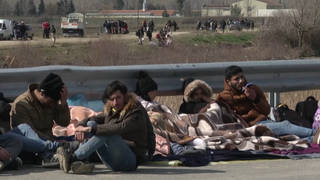
Related
Topics
Over the summer, four women were killed by their soldier-husbands stationed at Fort Bragg. Three of the soldiers were members of the Special Forces and had recently returned from fighting in Afghanistan. Lawyers, psychologists and other experts say this reflects a growing problem of domestic violence in the military.
Every 15 seconds a woman is battered in the United States.
Every 23 seconds a woman is raped in South Africa.
Every minute in the United Kingdom police receive a call for assistance in situations of domestic violence.
Almost half of all women in Bangladesh have been physically abused.
Today is the United Nations’ International Day for the Elimination of Violence Against Women. We’re joined in the studio by four leaders in the struggle to eliminate violence against women.
On this day in 1960, three sisters from the Dominican Republic were violently assassinated. They had been outspoken political activists against the US-backed dictator Rafael Trujillo.
The assassination shocked and enraged the nation and helped propel the anti-Trujillo movement. Within a year, the dictatorship came to an end.
The sisters became known as the “Unforgettable Butterflies” and have become a symbol of both popular and feminist resistance. Their assassination inspired author Julia Alvarez to write her novel, “In the Time of the Butterflies.” Latin American feminists declared November 25th an international day to end violence against women in the 1980s. The U.N. recognized the day in 1999.
All four of our guests will be participating in a special event called “Not A Minute More”, organized by the United Nations Development Fund for Women (UNIFEM).
This will include presentations highlighting effective strategies to combat violence against women. It will take place at Dag Hammarskjöld Auditorium at the United Nations, 1st Avenue and 42nd Street, from 1:00 2:30pm today.
Guests:
- Nadera Shalhoub-Kevorkian, professor of criminology at Hebrew University, Jerusalem, and project director at the Women’s Centre for Legal Aid and Counseling (WCLAC), a key resource in the West Bank and Gaza for the defense of the legal and social rights of Palestinian women. She works extensively on intervention models and strategies to assist female victims to cope with abuse, and is known for her activism against femicide. She is currently working with the United Nations Development Fund for Women (UNIFEM) on a project to sensitize officials in the criminal justice system in Palestine and Jordan to deal effectively with cases of sexual abuse.
- Archana Ramasundaram: At a young age, Ms Ramasundaram made an uncommon career decision and joined the Indian Police Service. More than 2 decades later, she is now Joint Director of the Central Bureau of Investigation, and committed more than ever to ending discrimination against women. She has worked personally with numerous victims of violence, focusing on the protection of women’s rights, sensitization of the authorities, and just punishment for crimes of violence. Ms Ramasundaram holds degrees in economics and criminology, and was awarded the Indian President’s Police Medal for Meritorious Service in 1995.
- Rakiya Omaar, a Somali human rights activist, Omaar is director of African Rights, an NGO working to bring the voices of violence survivors to the center of the human rights debate. Omaar is currently working with UNIFEM on a project documenting the experiences of rape victims of the Rwandan genocide, who live with HIV/AIDS. A leading figure in human rights and justice issues in Africa, Omaar has written extensively on the atrocities in Rwanda. Her book, 'Rwanda: Death, Despair, and Defiance', is the earliest detailed account of the 1994 genocide, and the first attempt to document the harrowing evidence of physical and psychological horrors inflicted upon Rwandan women.
- Doris Solis Corrion, Vice Mayor of the municipality of Cuenca, Ecuador. She was instrumental in instituting Cuenca’s Equal Opportunities Plan, which provides for gender mainstreaming in all areas of Cuenca’s public policy. The plan includes strengthening the system of sociological, legal, and health services for battered women, education and sensitization campaigns for law-enforcement agencies, and drafting of municipal laws committing local government to eradicating violence. Prior to her term as Vice Mayor, Ms. Solís Carrión was Executive Director of the NGO, SENDAS (Servicios para un Desarrollo Alterbativo del Sur) as well as co-founder of the program of gender studies at the University of Cuenca. She is the author of numerous articles and publications on gender and development in Latin America.











Media Options